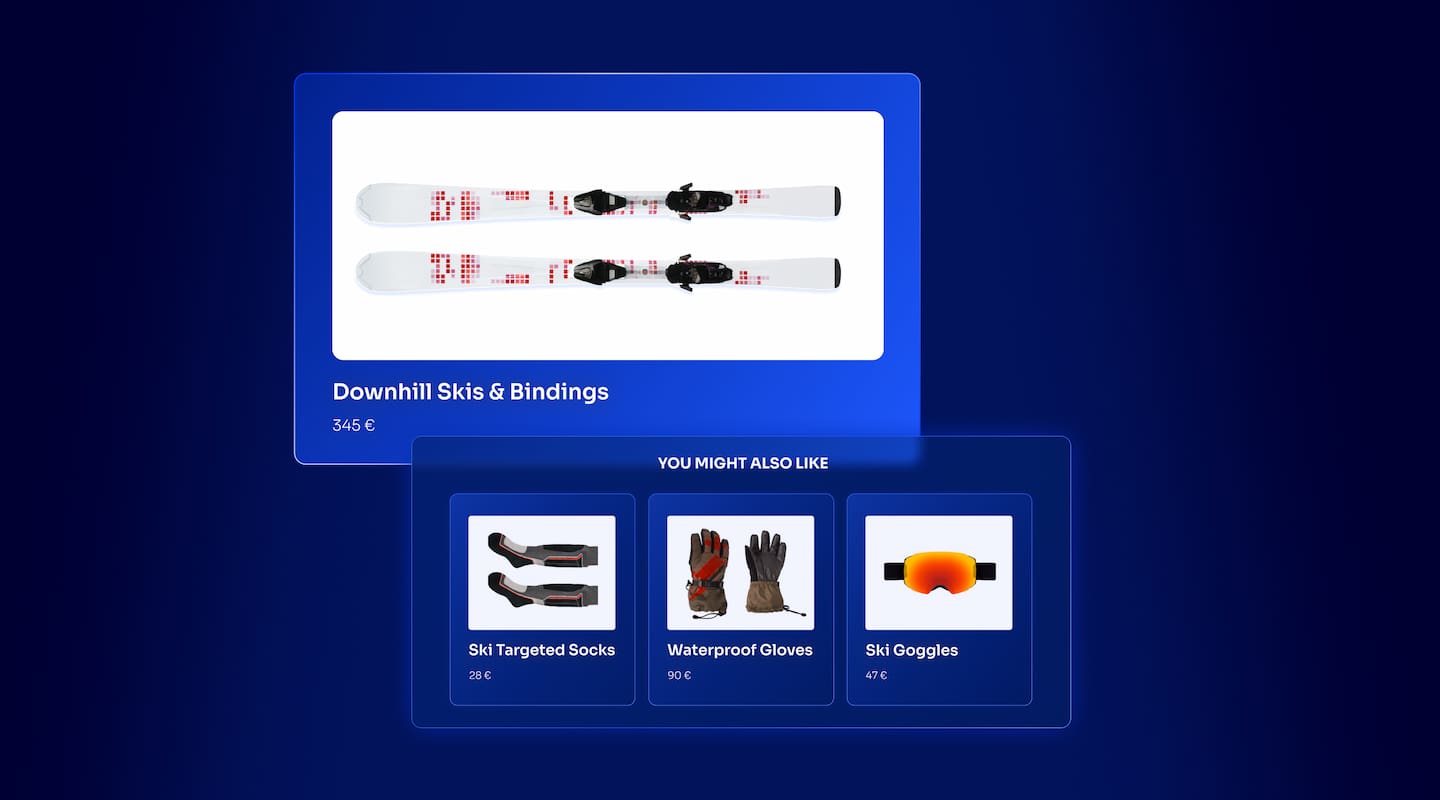Add InstantSearch and Autocomplete to your search experience in just 5 minutes
A good starting point for building a comprehensive search experience is a straightforward app template. When crafting your application’s ...
Senior Product Manager


A good starting point for building a comprehensive search experience is a straightforward app template. When crafting your application’s ...
Senior Product Manager

The inviting ecommerce website template that balances bright colors with plenty of white space. The stylized fonts for the headers ...
Search and Discovery writer

Imagine an online shopping experience designed to reflect your unique consumer needs and preferences — a digital world shaped completely around ...
Senior Digital Marketing Manager, SEO

Winter is here for those in the northern hemisphere, with thoughts drifting toward cozy blankets and mulled wine. But before ...
Sr. Developer Relations Engineer

What if there were a way to persuade shoppers who find your ecommerce site, ultimately making it to a product ...
Senior Digital Marketing Manager, SEO

This year a bunch of our engineers from our Sydney office attended GopherCon AU at University of Technology, Sydney, in ...
David Howden &
James Kozianski

Second only to personalization, conversational commerce has been a hot topic of conversation (pun intended) amongst retailers for the better ...
Principal, Klein4Retail

Algolia’s Recommend complements site search and discovery. As customers browse or search your site, dynamic recommendations encourage customers to ...
Frontend Engineer

Winter is coming, along with a bunch of houseguests. You want to replace your battered old sofa — after all, the ...
Search and Discovery writer

Search is a very complex problem Search is a complex problem that is hard to customize to a particular use ...
Co-founder & former CTO at Algolia

2%. That’s the average conversion rate for an online store. Unless you’re performing at Amazon’s promoted products ...
Senior Digital Marketing Manager, SEO

What’s a vector database? And how different is it than a regular-old traditional relational database? If you’re ...
Search and Discovery writer

How do you measure the success of a new feature? How do you test the impact? There are different ways ...
Senior Software Engineer

Algolia's advanced search capabilities pair seamlessly with iOS or Android Apps when using FlutterFlow. App development and search design ...
Sr. Developer Relations Engineer

In the midst of the Black Friday shopping frenzy, Algolia soared to new heights, setting new records and delivering an ...
Chief Executive Officer and Board Member at Algolia

When was your last online shopping trip, and how did it go? For consumers, it’s becoming arguably tougher to ...
Senior Digital Marketing Manager, SEO

Have you put your blood, sweat, and tears into perfecting your online store, only to see your conversion rates stuck ...
Senior Digital Marketing Manager, SEO

“Hello, how can I help you today?” This has to be the most tired, but nevertheless tried-and-true ...
Search and Discovery writer
COVID-19 has accelerated global digital transformation. Everything has shifted online, from gift shopping to grocery shopping to streaming media consumption. Customers expect easy, frictionless, personalized digital experiences. Enterprise search, in short.
The shift has not just happened online for consumers: employees are looking for intranet and knowledge management tools to find the information they need to stay productive while working and collaborating remotely from locations around the world. Again: Enterprise search.
We build enterprise search products for both external public users (customers), and internal users (employees and business teams). An efficient search engine enables both your customers and employees to more quickly access your most critical information. It induces more consumption, engagement, and collaboration, while dramatically increasing efficiency.
Search is an unsung hero, a powerful application that unifies your data and metadata, rendering them more discoverable, digestible, and easily actionable. The data can be in any format—products, videos, spreadsheets, documentation, articles, blogs, client information, intranet financial reporting—or that of many other market or work-related types of content. Good search technology can be integrated with existing in-house and third-party tools and data sets.
What is enterprise search? This article answers that question and then provides a roadmap of how to optimize your enterprise search software capabilities, from capturing analytics to gaining business insights and building powerful internal search experiences that integrate with your back-office systems.
Enterprise companies typically follow a needs-based strategy with search. They start by upgrading their online search to boost customer engagement and conversion rates. Only then do leading enterprises regroup and develop a robust search-based framework that integrates with their back-office systems, data, and workflows enabling business teams to function optimally.
Let’s outline the 3-step roadmap Algolia provides. You can:
All of Algolia’s clients need great online search. They need to enable better digital customer experiences that result in greater engagement and conversion. They need to get up and running quickly with low resources. They need search expertise to build an online experience that grows their ROI.
Start by deciding where your search interface should be located and what it should look like. Is it the first item that appears on your home page? A supplemental tool buried on a secondary page? Also, put some thought into how you want search results to appear: titles and links may be fine, but your users will probably want more, depending on your industry, for instance, images, a short summary, or prices.
If your business team doesn’t have a lot of experience with building a web search tool, you can partner with us. We provide a fast and responsive enterprise search engine with advanced features such as recommendations, personalization, and many ways to manage your content and fine-tune your relevance, whether manually or in an automated way using AI. You’ll also get out-of-the-box, fully customizable front-end UI tools and libraries to help you build a rich Search and Discovery experience that integrates seamlessly with your business use case and branding.
Our analytics engine improves the relevance and usability of your search over time. Analytics helps you track what people are looking for, what they click and convert on, and which searches are most effective.
You can also leverage analytics to drive content creation and expand product assortment. Search analytics tell you what kind of products and content your users want. Use this data to help you create new content and products that already have a prospective audience.
Be responsive to changing markets and customer needs. What does this mean? After quickly delivering a first version of your site search solution to solve the most pressing problems, iterate and optimize by improving relevance, adding AI-automated relevance tools such as Dynamic Re-Ranking and Dynamic Synonym Suggestions, and upgrading your front-end UI with more advanced features such as merchandising, Personalization, faceting, and Autocomplete. These are all attributes of leading enterprise search experiences that users have come to expect.
An enterprise’s data is often massive and disorganized. Information gets lost or is just not known. Systems are outdated and difficult to adapt. Employee productivity, collaboration, and communication are suboptimal. Tasks and workflows are inefficient.
You want to enable everyone from engineers to business managers to build, configure, and easily support the online services and internal processes that run your organization. You want to increase workflow efficiency and employee productivity, and manage internal content, with a modern, adaptable API and search engine framework that connects people, software, and data.
Provide a systemwide search and indexing user experience that unifies your back-end stack, uncovering key data and information relationships between systems. You can do this by indexing data or content from multiple sources and sending it to our hosting service. The information can come in any structured and unstructured data format. Our search engine structures it for search purposes. Additionally, you can federate your search by combining distinct sources of data in a single multifaceted “federated search” interface.
Integrate custom-made search connectors and functionality with and across your existing third-party applications, such as Salesforce, SAP, Confluence, Google Docs, SharePoint, Jira, and other content management systems (CMS), enterprise resource planning (ERP) tools, customer applications, repositories, crawlers, microsoft, Amazon Web Services (AWS), social media, and business platforms.
Enterprises often have great information, but they also have too much data to reasonably manage. There is no easy way to sort through and see the relationships between different data points or pieces of content. It’s hard to know what is important and would be worth discovering. And related content is underused.
Capture usage analytics that feed powerful a AI with machine learning data sets and models in order to personalize, predict, recommend, and continually improve results with A/B testing.
Create deeply relevant search and reporting interfaces that expertly visualize your analytic- and AI-driven business insights and search applications.
Instead of building internal machine learning search teams—which is highly complex and can take years and consume enormous resources—you can get your AI and ML capabilities out of the box with Algolia’s insights engine.
Enterprise search begins with creating a powerful Search and Discovery experience for your customers. But a hosted search API goes beyond that online experience: it can transform the internal processes and systems that run your business.
Here’s one way to look at it: Every single search user interface has the capacity to display one or more sets of results. That’s a great achievement when done right. But if you go further and start to combine all your search interfaces in one unified interface, you can create a consolidated (federated) search experience. That unifies all of your data and available items under one roof. You end up with a set of composable search engine APIs in which your data is hosted and accessible in any region of the world, thereby serving all your customers and employees.
Powered by Algolia Recommend